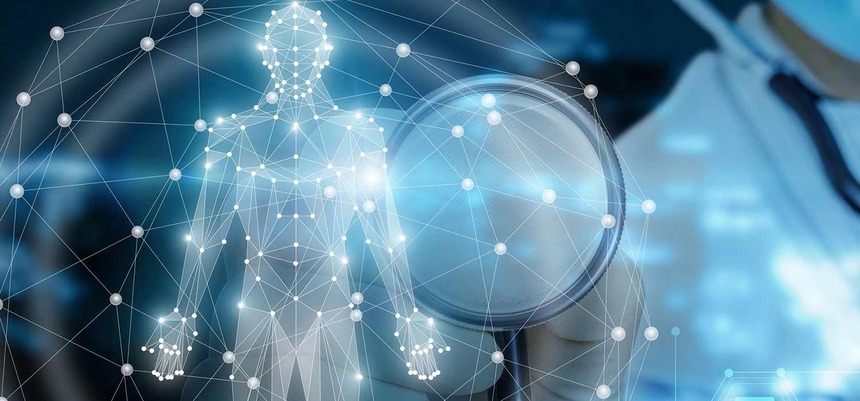INI CET College Predictor 2025
Predict admission chances in AIIMS, JIPMER, PGIMER & NIMHANS Campuses
Artificial Intelligence is transforming different fields and healthcare is also not left behind. AI has reshaped the way doctors use to diagnose, treat and monitor their patients thus helping in getting more accurate diagnostic results and also aiding in personalised treatments. In this article, we will explore how artificial intelligence in healthcare has transformed the medical field.
This Story also Contains

Medical AI can process massive amounts of data, identify patterns and make predictions. It has revolutionised the way medical services are delivered. The scope of artificial intelligence in the medical field is vast, ranging from analysing radiological images for early detection of disease to forecasting outcomes using electronic health records. By integrating AI into hospitals and clinics, healthcare systems can operate more intelligently, ultimately enhancing care for millions of patients worldwide.
Also read: Scope of AI in India
With the help of AI in the medical field, medical professionals can make better decisions by accessing precise data, leading to time savings, cost reductions and enhanced management of medical records. This article from Careers360 will help you explore AI’s role in healthcare, its potential applications and how it is helping in diagnosing and treating diseases thus reducing burdens of the medical professionals.
Diagnosing a disease requires a variety of tests, imaging scans and often physical examination. AI has the pattern recognizing ability which complements data analysis and offers diagnoses with high accuracy. For example, AI-powered algorithms are now being used to examine medical imaging such as X-rays, MRIs and CT scans.
AI medical diagnosis particularly is effective in areas like oncology, where early detection can significantly improve patient outcomes. AI-driven diagnostic tools can provide real-time feedback to clinicians, helping them to make informed decisions ultimately saving lives through early detection.
The concept of personalised medicine is another application of artificial intelligence. AI plays a crucial role in helping doctors analyse and interpret vast amounts of genomic data. For example, AI can help identify mutations in a patient’s DNA that may predispose them to certain diseases, allowing for preventive treatments before symptoms even occur.
Also, medical AI is used to develop medical treatments based on individual variability. This refers to the designing of customised treatment plans that are more effective for specific patients. In areas such as oncology or IVF, where treatment plans are complex, AI in healthcare courses can suggest the most effective drugs or therapies thus enhancing the personalization of care.
The process of drug discovery in earlier days was time-consuming and expensive, often taking years to bring a single drug to market. AI in medicine and healthcare is now helping pharmaceutical companies accelerate the process by predicting the interactions between different biological targets. Machine learning algorithms can analyse existing scientific data to identify potential drugs much faster than researchers.
AI is also being used to design new drug molecules. It can simulate interactions between drug molecules and human proteins, predicting their effectiveness thus leading to saving time in the laboratory and clinical trial stages. This can reduce the cost of drug development, leading to faster approval of life-saving medications.
Also read: Online artificial intelligence for healthcare courses and certifications
AI-powered virtual health assistants are now being integrated into healthcare systems to assist patients thus reducing the workload on healthcare professionals. These tools can answer common questions of the patients providing medical advice based on user inputs and even reminding them to take their medications on time. This support has reduced unnecessary visits to clinics or hospitals. AI in the medical field can also manage chronic diseases, monitoring patient’s conditions in real-time and notifying doctors if medication is needed thus reducing healthcare costs.
Another major development of AI in medicine is robotic surgery. AI-powered robotic systems are now being used to perform highly precise surgeries leading to minimised human errors and improved patient outcomes. These systems also assist surgeons by providing real-time data during the procedure. For example, AI algorithms can process data from patient vitals, alerting surgeons to potential complications. Robots are even capable of performing intense surgeries independently.
Also read: AI and robotics courses
A huge volume of health data generated today, from electronic health records (EHRs) to medical imaging, is overwhelming for many healthcare systems. AI can help manage and make sense of this data by automating routine tasks like data entry, scheduling and billing, freeing up healthcare professionals to focus on patient care. Also, AI can analyse health records to identify patterns, predict patient results and assist in decision-making. For example, machine learning algorithms can predict which patients are at risk of developing certain conditions, enabling earlier intervention.
The future of AI in healthcare is filled with immense potential that can reshape the medical field in unimaginable ways. AI has the potential to revolutionise the healthcare industry by enhancing diagnostics, personalising treatments and improving patient care outcomes. AI will increasingly be used to analyse vast amounts of data from medical records, imaging, and genomics to deliver faster, more accurate diagnoses and enable early disease detection. It will also play a significant role in the development of personalised medicine, where treatments are tailored to individual patients based on their genetic makeup and medical history. AI powered tools will be used to streamline hospital operations, reducing costs and lowering the burden on the administration. As AI continues to advance, it will transform healthcare into a more efficient, predictive, and personalised system, improving patient outcomes and care delivery across the globe.
Ranked #18 by NIRF, NAAC A++ Accredited | Unmatched clinical exposure with over 7 lakh patients yearly
Allied & Healthcare programs | 20+ Partner Universities & Institutes | 98% placement record
Check your expected admission chances in MD/MS/Diploma courses based on your NEET PG Score
Your one-stop NEET PG counseling package with complete hand-holding throughout the admission journey
Get Job-Ready with New-Age Allied Health Programmes
Get Job Ready in Healthcare | Employability-Focused Programs